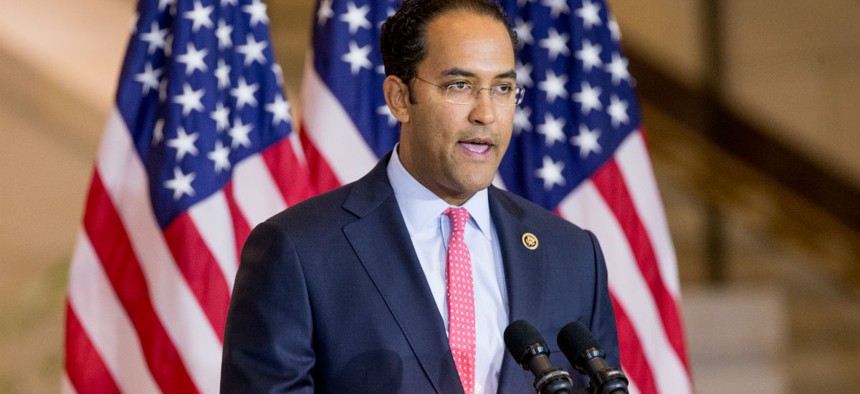Rep. Hurd’s Solution For Tech Talent Shortage: 10 Day Tours of Duty

Rep. Will Hurd, R-Texas Andrew Harnik/AP
The Cyber National Guard could provide a constant stream of short-term talent, the lawmaker says.
If one lawmaker gets his way, a corps of tech companies will contribute a handful of employees to the federal government each quarter, for ten days at a time.
It’s part of a plan Rep. Will Hurd, R-Texas, calls the “Cyber National Guard,” and he and his legislative staff are working on making it a reality, he said at a Professional Services Council event in Washington Monday.
Ten days a quarter would be an ideal timeframe, Hurd said, because it “allows the business to prepare for having that employee gone, and it’s enough time where you can have an impact on the federal agency.”
Hurd has also suggested providing scholarships to students studying computer science in exchange for working for the federal government for four years. Instead of working at the National Security Administration or the Defense Department, agencies that traditionally draw elite cyber talent, Hurd suggested those students work across agencies like the “Department of the Interior, at the U.S. Census Bureau [or] the Social Security Administration,” which do not have the same cyber pedigree as their military and intelligence counterparts.
Some similar scholarships currently exist but only on a limited basis.
If those graduates later go to the private sector, those and any other tech professionals interested in contributing to the federal government could be loaned back to the government for short periods, Hurd explained.
» Get the best federal technology news and ideas delivered right to your inbox. Sign up here.
Hurd cited a Government Accountability Office statistic pegging the number of unfilled federal tech positions at about 15,000. And many of those jobs don’t have common job descriptions that map to private sector skills, he explained—his office plans to work with the White House’s new Office of American Innovation and the Office of Personnel Management to standardize job requirements.
Many of those unfilled positions are under chief information officers at federal agencies; some of those CIO positions are filled with people serving in “acting” capacities.”
Empty CIO Offices May Handicap Modernizing Government Technology Act
Hurd warned that non-permanent CIOs are “not going to probably do anything earth-shattering,” he said. With widespread gaps in tech leadership, he said, not all agencies will be able to appropriately implement the Modernizing Government Technology Act.
That bill, which Hurd sponsored, directs agencies to shore up their outdated technology. The bill was included in the National Defense Authorization Act of 2018, which recently passed the Senate, though it's unclear if Hurd's legislation will make it into the House-Senate conference version of the must-pass annual defense policy bill.
“I think over time there will be a correlation between the folks using MGT and the quality of that CIO,” Hurd said. The legislation would create working capital funds in federal agencies to be used for modernization projects, and a government-wide fund that agencies can apply to for additional support.
In general, there’s a misconception that federal tech professionals “know everything,” Hurd said.
“If my life depended on having to break into a network and I had the option of picking a team from my old days in government, or my private sector colleagues, I’d pick my private sector colleagues,” said Hurd, who served both as a CIA officer and as a private sector cybersecurity adviser.


